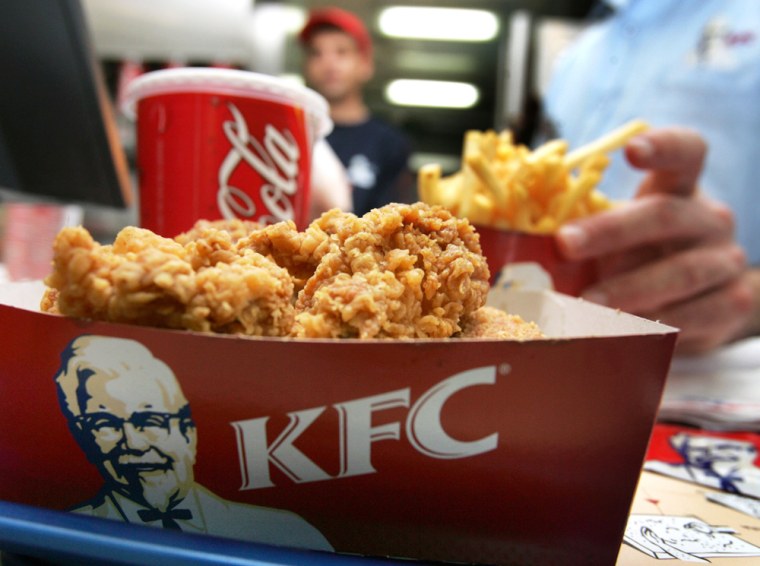A doctor and a consumer advocacy group sued KFC Tuesday, seeking to force the fried chicken restaurant chain to stop cooking with a type of oil that has been implicated in heart disease.
The Center for Science in the Public Interest, in a suit filed against Yum Brands Inc. in the Superior Court for the District of Columbia, said some KFC meals were "startlingly" high in artery-clogging trans fat from the partially hydrogenated oils used for frying. KFC said the lawsuit was baseless.
CSPI executive director Michael Jacobson said it was harder to avoid trans fat at KFC than at other fast-food restaurants.
"Trans fat is almost everywhere on this menu. By frying in such a dangerous oil, KFC is making its unsuspecting consumers' arteries extra crispy," he said, referring to a version of fried chicken sold by KFC.
The suit seeks to force the KFC chain to stop cooking with trans fat or clearly warn customers about the health hazard.
KFC "does not properly warn, disclose or even tell consumers that they are eating food items prepared with the worst oil available," the group said in a legal complaint.
The group asked the court to switch to a healthier frying oil. If that is ruled out, the group asked the court to require signs at KFC outlets saying "KFC fried chicken and certain other foods contain trans fat, which promotes heart disease."
"This is a frivolous lawsuit completely without merit and we intend to vigorously defend our position," KFC spokeswoman Laurie Schalow said in an e-mailed statement. "All KFC products are safe to eat and meet or exceed all government regulations, and we take health and safety issues very seriously."
She said the restaurant chain has been considering alternative oil options, "but there are a number of factors to consider including maintaining KFC’s unique taste and flavor of Colonel Sanders' Original Recipe, supply availability and transportation, among others.”
Dr. Arthur Hoyte, a retired physician from Rockville, Md., is acting as lead plaintiff in the case, and the CSPI is seeking class-action status on behalf of anyone who ate at a Washington-area KFC in 2004 or 2005.
I had known that KFC uses an unnatural frying oil, and that their food was so high in trans fat, I would have reconsidered my choices,” Hoyte said.
Along with stopping KFC from using oil with trans fats, Hoyte and CSPI are seeking economic damages.
CSPI said a typical three-piece combo meal with an Extra Crispy chicken drumstick, two Extra Crispy thighs, potato wedges and a biscuit contained 15 grams of trans fat.
Health experts suggest minimizing trans fat consumption as much as possible. Research shows it raises LDL or "bad" cholesterol while lowering HDL, the "good" cholesterol.
Last week, No. 3 U.S. burger chain Wendy's International Inc. said it would significantly cut trans fat from its menu by switching to a new blend of corn and soy oil for french fries and breaded chicken items. McDonald's Corp. vowed in 2002 to remove trans fat from its french fries in the United States but has not done so.
Yum Brands, based in Louisville, Ky., also operates the Pizza Hut and Taco Bell fast-food chains.
The lawsuit marks the second time in the past three years that KFC and CSPI have crossed paths. KFC settled a complaint filed by the group with the Federal Trade Commission in 2004 over ads claiming its fried chicken was compatible with then-popular low-carb diets.
Under the settlement, KFC was barred from running advertisements saying that eating its food is healthier than eating another food unless it can back the claims up scientifically.
CSPI, often nicknamed the “food police,” is known for campaigning against high-calorie and high-fat fare.
The industry-funded Center for Consumer Freedom said CSPI had filed the suit simply to generate media coverage.
“Any judge unfortunate enough to be burdened with this court-clogging sham should have the good sense to throw CSPI out of court,” said Center for Consumer Freedom research analyst J. Justin Wilson in a written statement.
